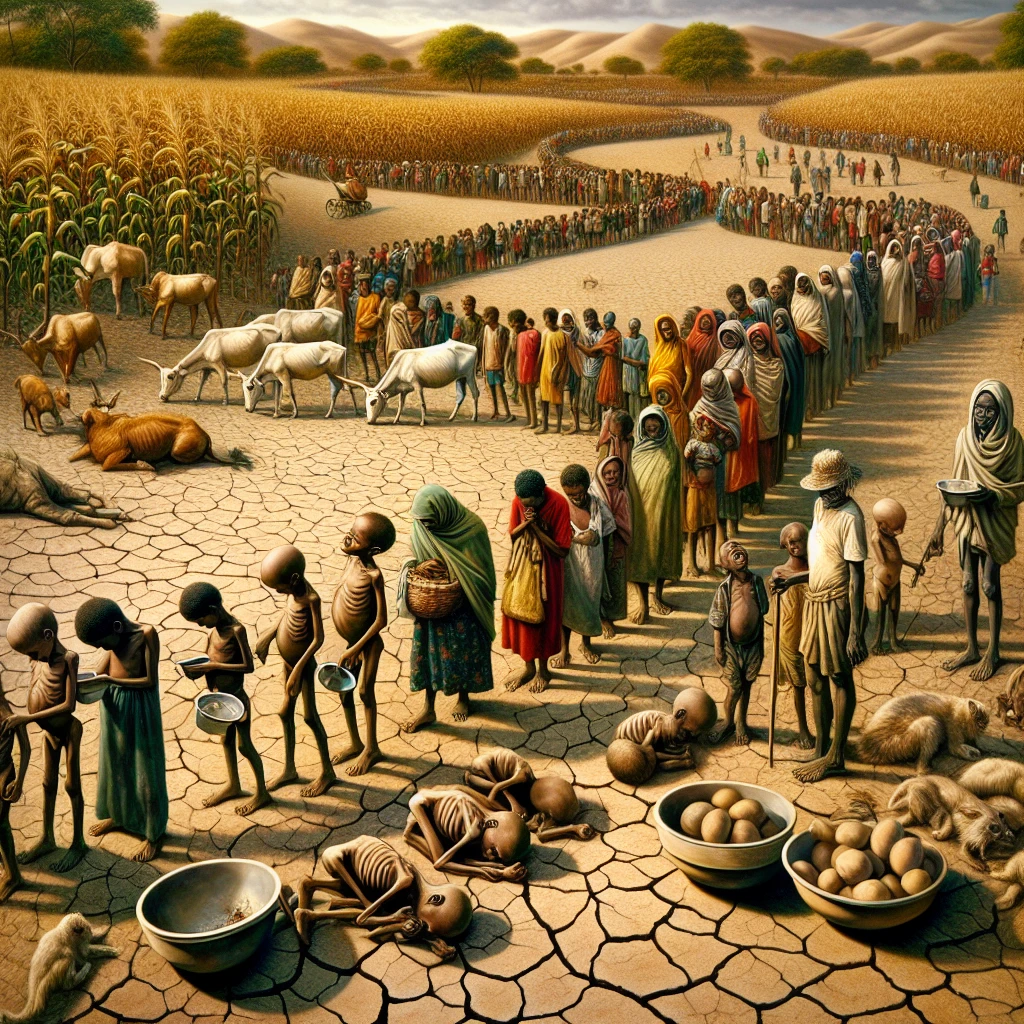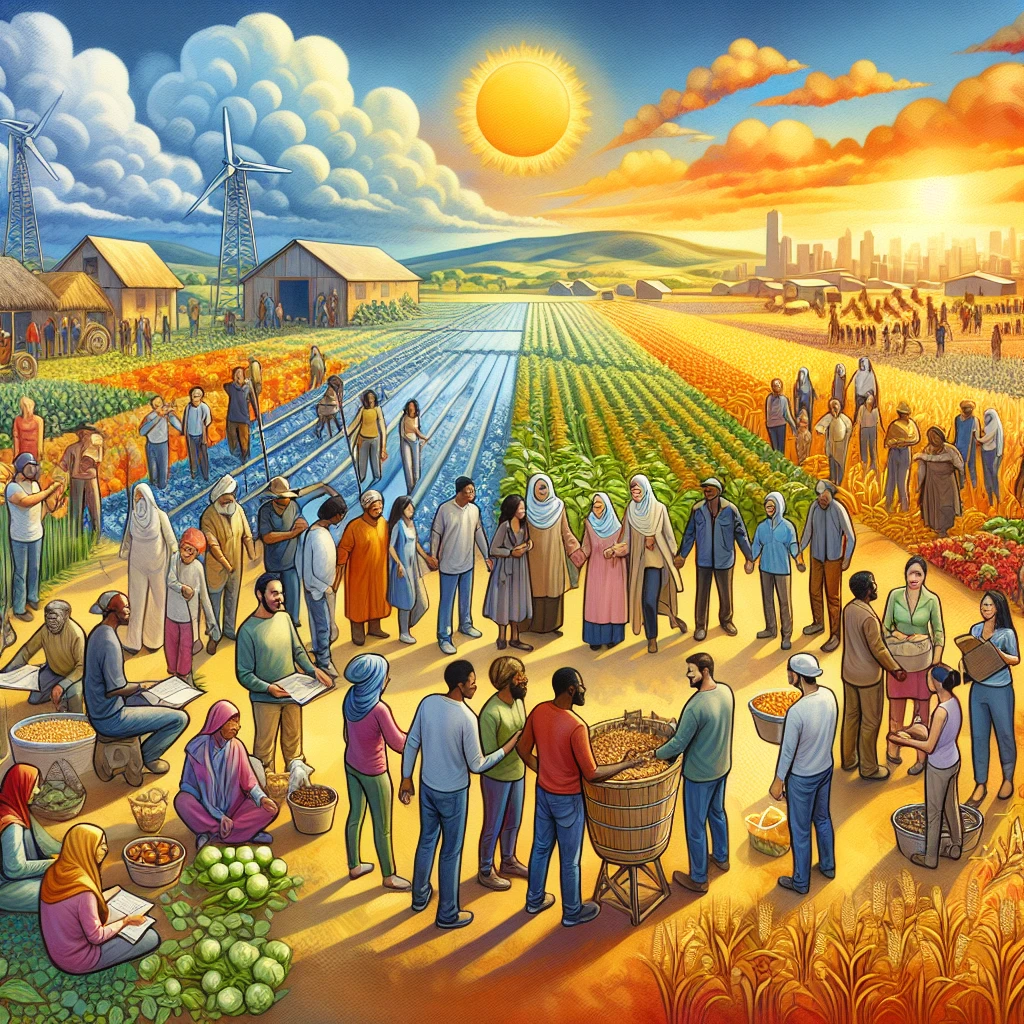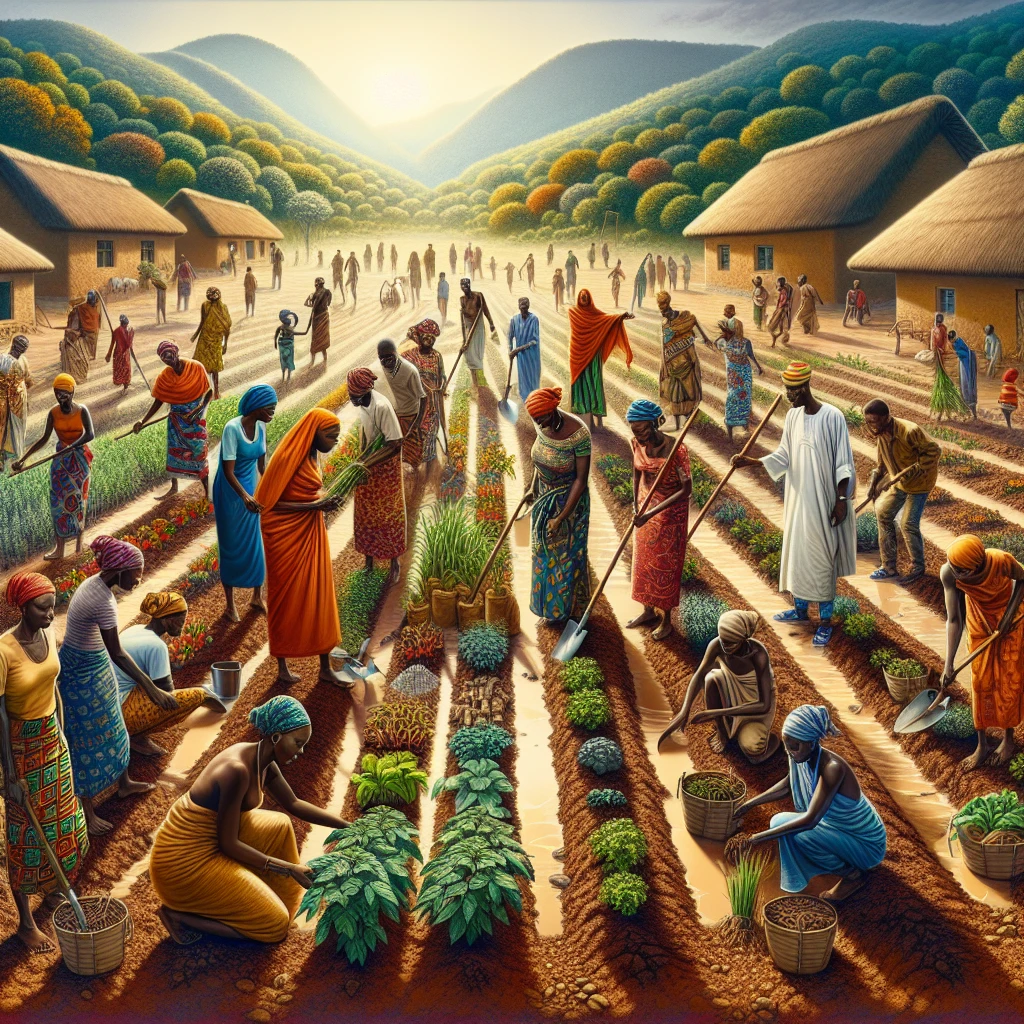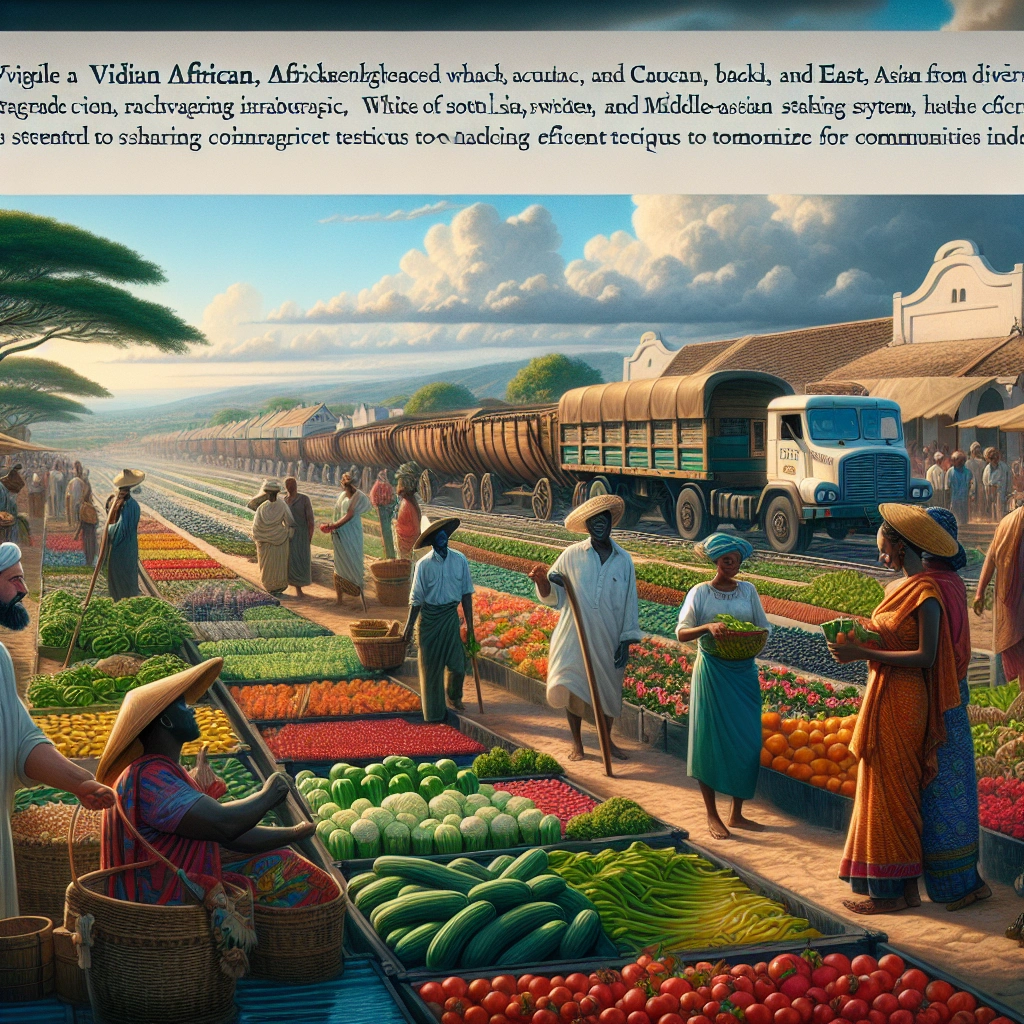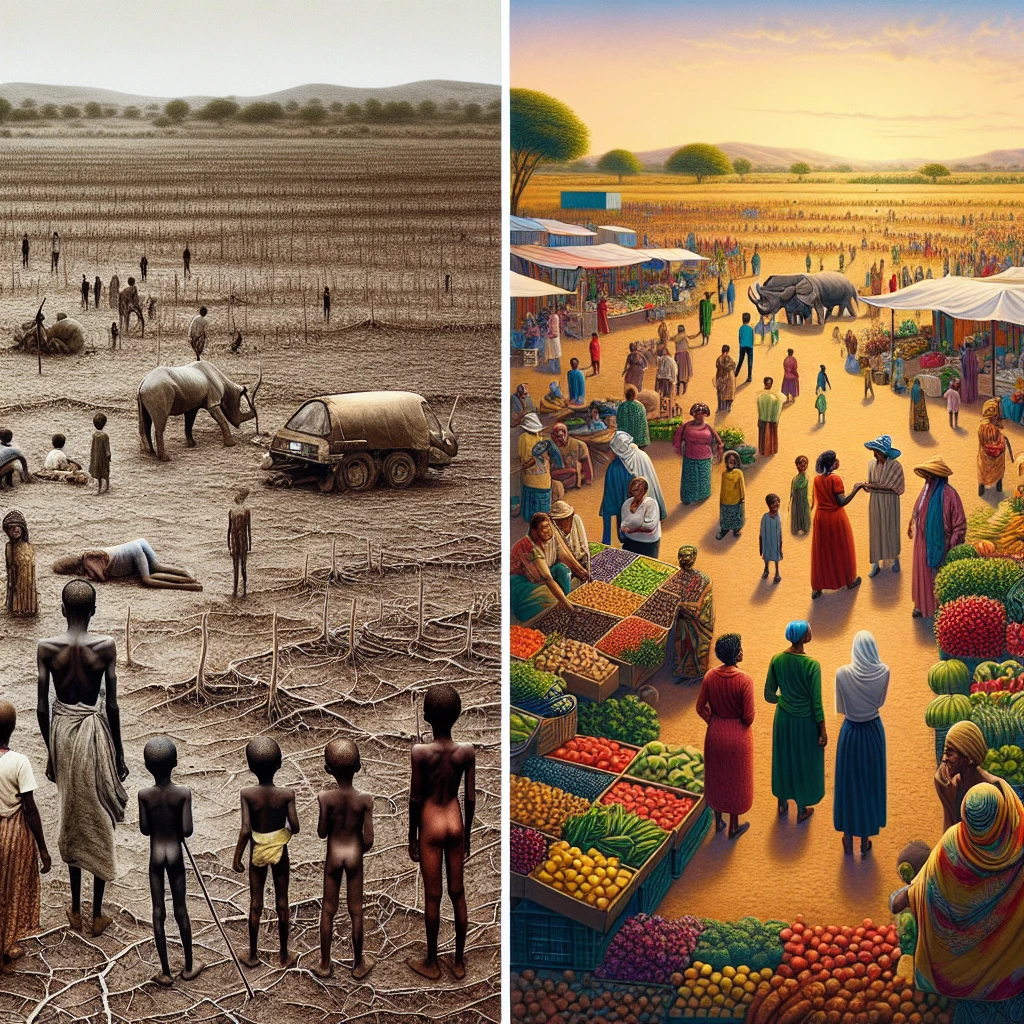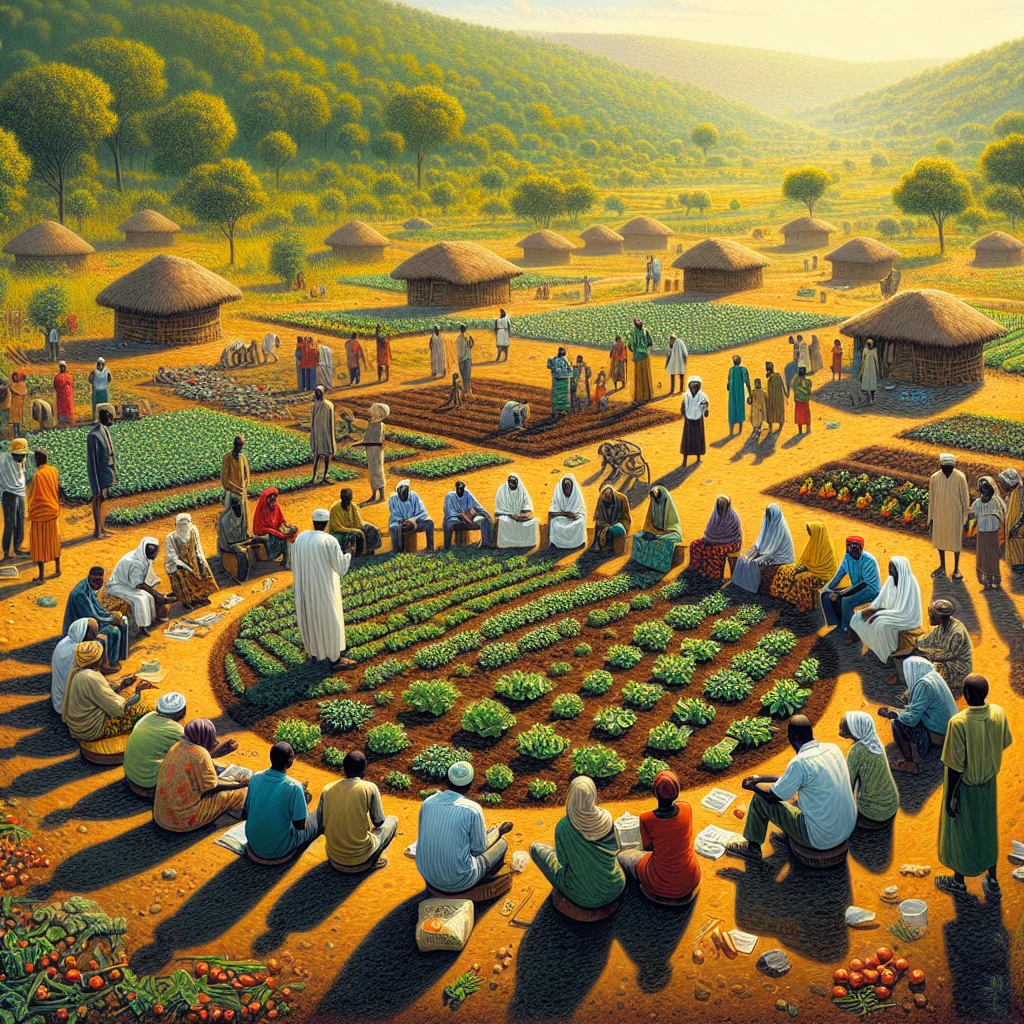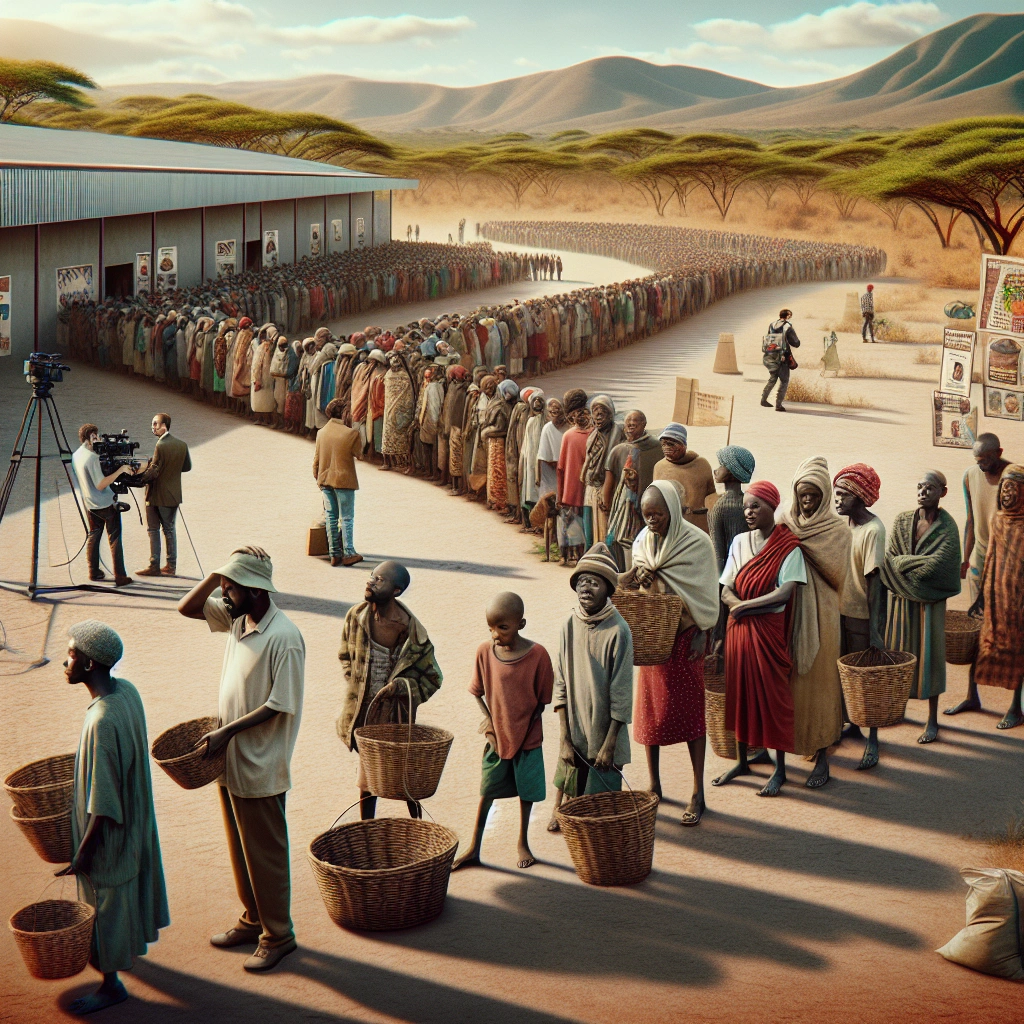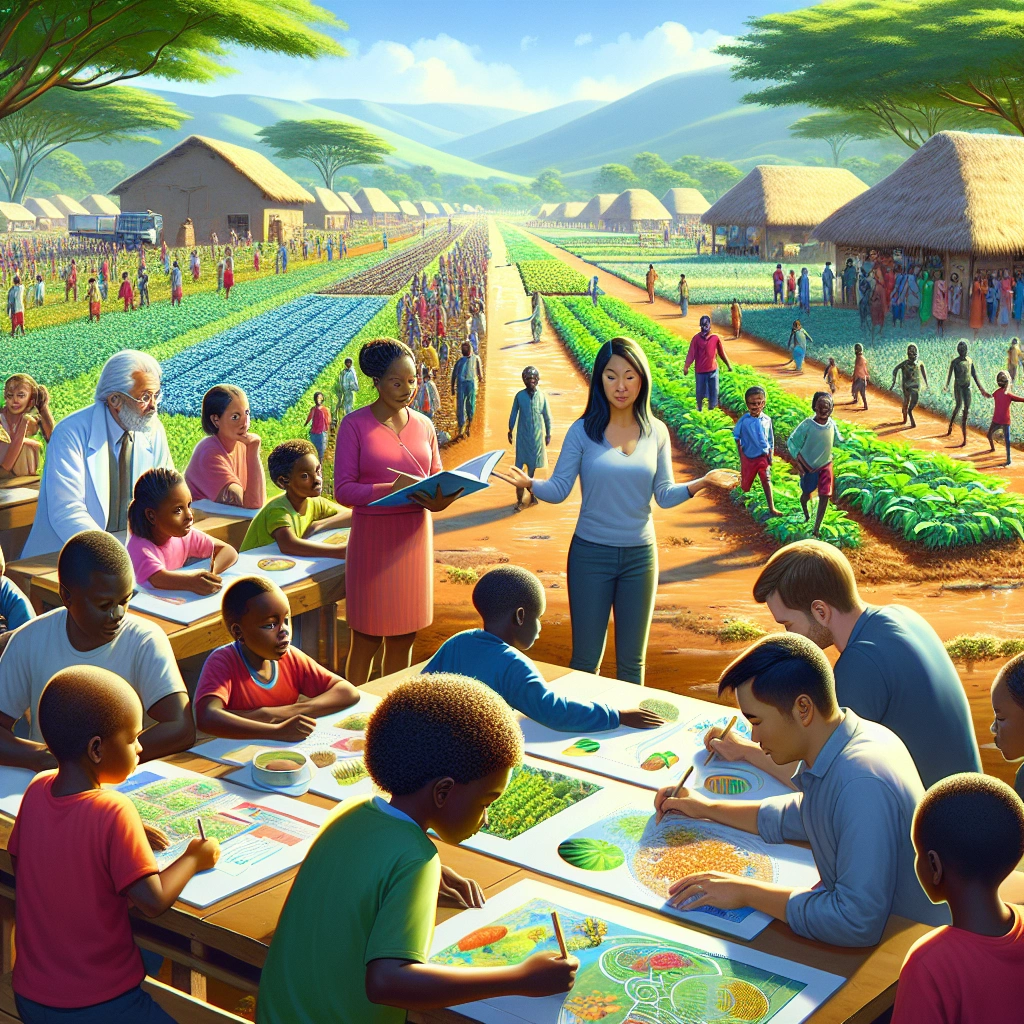

A food crisis in Africa refers to a situation where a large number of people in the continent do not have access to sufficient, safe, and nutritious food, leading to hunger and malnutrition.
The importance of addressing the food crisis in Africa cannot be overstated – it leads to severe health issues, hinders economic development, and perpetuates the cycle of poverty in the region.
Factors such as climate change, conflict, and economic shocks are contributing to the food crisis in Africa, making it crucial to address these issues in order to ensure food security for the people of Africa.
Check out this Youtube video: “Africa: 346 million facing food insecurity; hunger crisis surge…” It’s important to stay informed about the food crisis in Africa and how it’s impacting millions of people.
Factors Contributing to the Food Crisis in Africa
Climate change and its impact on agriculture
Climate change is posing a significant challenge to agricultural development in Africa. With increasing temperatures and unpredictable weather patterns, crop and livestock yields are becoming more volatile.
This has led to reduced crop yields across sub-Saharan Africa, with a projected 10% decrease by the 2050s under a warming scenario of about 2 degrees Celsius. Moreover, extreme weather events are expected to become more frequent and severe in Africa, exacerbating the continent’s vulnerability to climate impacts.
Political instability and conflict disrupting food production and distribution
Political instability and conflict have greatly disrupted food production and distribution in Africa. One notable example is the conflicts between pastoralists and farmers in the African Sahel, leading to disruptions in the supply and distribution of inputs, with farmer-herder conflicts escalating in West and Central Africa.
The impacts of conflicts on agriculture include the destruction of crops, disruption of supply chains, and the displacement of farming communities, contributing to food insecurity in the region.
Economic challenges leading to food insecurity
Africa’s food security challenges are compounded by economic challenges, including low government commitment to agricultural spending and inadequate food processing technologies. African governments have shown a low commitment to spending on agriculture, particularly in the area of extension services.
The economic challenges have resulted in vulnerability to supply chain shortages and exogenous shocks, exacerbating food insecurity in Africa. The continent’s food systems are at a crossroad, facing recurrent outbreaks, extreme weather events, and climate change, further heightening the economic challenges contributing to food crisis.
| Climate Change Impacts | Political Instability | Economic Challenges |
|---|---|---|
| – Reduced crop yields across sub-Saharan Africa- More volatile crop and livestock yields | – Farmer-herder conflicts disrupting supply chains- Displacement of farming communities- Destruction of crops | – Low government commitment to agricultural spending- Inadequate food processing technologies |
Impact of the Food Crisis in Africa
Malnutrition and hunger among African populations
The food crisis in Africa has resulted in dire consequences, with an alarming 41.7% of people, approximately 90 million individuals, facing extreme hunger. This widespread malnutrition has led to approximately 278 million people being undernourished, a significant increase from preceding years.
Implications for healthcare and public health
The implications for healthcare and public health due to the food crisis in Africa are profound. Food insecurity has adversely affected the health of African populations.
It has been empirically proven that food insecurity detrimentally influences human health. With a substantial portion of the population undernourished, nutritious food and food security are critical to improving health outcomes.
Potential for social and political instability
The food crisis in Africa poses a considerable risk for social and political instability. Poverty and internal armed conflict are heightened in countries facing food insecurity, exacerbating the potential for unrest.
The lack of resilience in food supplies and prices due to climate change further contributes to the vulnerability of sub-Saharan Africa, raising concerns about sustained political and social stability.
| Key Points | Impact |
|---|---|
| Malnutrition and hunger | 41.7% facing extreme hunger |
| Healthcare and public health | Food insecurity adversely affects human health |
| Social and political instability | Heightened risk due to poverty and armed conflict |
Historical Context of Food Insecurity in Africa
Famines and food shortages in African history
Famines and food shortages have been recurrent in African history, with devastating consequences. Notable famines include the Great Ethiopian Famine of 1888, which resulted from drought and locust plagues, causing the death of one-third of the population.
Similarly, the Biafran War in Nigeria led to widespread famine in the late 1960s, affecting millions of people due to the blockade and conflict-induced food shortages.
Colonial and post-colonial impacts on agricultural systems
Colonialism significantly impacted African agricultural systems through the imposition of cash crop cultivation, which often displaced food crop production. The legacy of colonialism is still evident in the existing land tenure systems and agricultural practices.
Post-colonial challenges, such as political instability and land usage, continue to affect food security in various African nations.
Efforts to address food insecurity in the past
Numerous efforts have been made to address food insecurity in Africa. Initiatives have included the implementation of agricultural reforms, promotion of sustainable farming practices, and the establishment of food security programs.
However, persistent challenges such as climate change, political unrest, and economic disparities have hindered long-term solutions to food insecurity across the continent.
| Historical Context of Food Insecurity in Africa | ||
|---|---|---|
| Famines and food shortages | Colonial and post-colonial impacts | Efforts to address food insecurity |
| The Great Ethiopian Famine of 1888 | Imposition of cash crop cultivation | Implementation of agricultural reforms |
| The Biafran War, Nigeria | Legacy of colonial land tenure systems | Promotion of sustainable farming practices |
| Post-colonial political instability | Establishment of food security programs |
Current State of the Food Crisis in Africa
Statistics on malnutrition and hunger in African countries
According to the Global Hunger Index, 278 million people in Africa, which is 20% of the continent’s population, suffer from chronic hunger, with 282 million undernourished. Shockingly, 55 million African children under the age of five are stunted due to severe malnutrition, reflecting the dire state of food insecurity across the region.
Analysis of the most affected regions and populations
Hunger has reached crisis proportions in specific African nations, including the Central African Republic, Chad, the Democratic Republic of the Congo, Madagascar, and Yemen, based on the Global Hunger Index. These regions bear the brunt of extreme hunger, amplifying the severity of the food crisis in Africa.
Comparison with global food insecurity trends
In comparison to the global scenario, Africa endures a significantly higher prevalence of hunger, with 20% of the population facing chronic hunger, in contrast to the global average of 10%. This highlights the magnitude of the food crisis in Africa, emphasizing the urgent need for sustainable interventions and support to address this pressing issue.
| Continent/Region | Prevalence of Chronic Hunger |
|---|---|
| Africa | 20% |
| Global Average | 10% |
The statistics and analysis reveal the alarming reality of the food crisis in Africa, necessitating immediate and concerted efforts to combat this profound challenge.
Solutions to Address the Food Crisis in Africa
Implementation of sustainable agricultural practices
Increased focus on sustainable agricultural practices is crucial for addressing the food crisis in Africa. For instance, promoting regenerative agriculture can help enhance soil health and crop productivity, leading to improved food security.
By adopting climate-smart policies and technologies, African farmers can mitigate the impact of environmental challenges and ensure sustainable food production for the future.
Investment in infrastructure for food distribution
Investing in infrastructure for food distribution is essential to stabilize regional food supply and prices. Climate-resilient infrastructure, such as solar power for irrigation and temperature control, not only protects food production from weather events but also creates employment opportunities.
Additionally, financing infrastructure, including roads and storage facilities, is crucial for ensuring food security for millions of people in Africa.
Support for small-scale farmers and food producers
Supporting small-scale farmers and food producers is vital for boosting agricultural productivity in Africa. Concerted investments in technology, skills, and public-private partnerships are necessary to enhance fertilizer production and distribution.
Moreover, initiatives like social cash transfers and private-sector-led engagement can help smallholders cope with post-harvest losses and weather shocks, contributing to long-term food stability and security.
| Sustainable Agricultural Practices | Infrastructure Investment for Food Distribution | Support for Small-Scale Farmers & Producers |
|---|---|---|
| – Promote regenerative agriculture | – Invest in climate-resilient infrastructure | – Support smallholders with social cash transfers and private-sector engagement |
| – Adopt climate-smart policies and technologies | – Finance infrastructure for food distribution | – Invest in technology and skills for small-scale farmers |
| – Enhance soil health and crop productivity | – Create employment through infrastructure projects | – Foster public-private partnerships for agricultural development |
| – Mitigate environmental challenges | – Ensure stable regional food supply and prices | – Address post-harvest losses and weather shocks for smallholders |
By implementing these solutions, Africa can make significant strides in overcoming the challenges posed by the food crisis, ensuring a more sustainable and resilient future for agricultural development and food security.
Role of International Aid and Organizations
Contributions of international organizations to addressing food insecurity
International organizations have played a crucial role in addressing food insecurity in Africa. Entities like the World Food Programme (WFP) and the Food and Agricultural Organization (FAO) have provided extensive support through food distribution, agricultural development, and nutritional assistance.
Their efforts have significantly alleviated hunger and malnutrition in the region.
Examples of successful intervention and support programs
The WFP’s initiatives in Africa, such as the West Africa Food Systems Resilience Program, have demonstrated success in improving food security. These programs have provided vital support to millions of people, offering sustainable solutions by investing in agricultural resilience and infrastructure, thus creating long-term impact.
Challenges and limitations of relying on aid for sustainable solutions
While international aid has made considerable progress, it faces challenges in achieving sustainable solutions. Dependency on aid can create a cycle of reliance, hindering local capacity building and self-sufficiency.
Additionally, political instability and natural disasters pose ongoing challenges to the effectiveness of aid efforts.
| International Aid Contributions | Description |
|---|---|
| FAO | Contributes to agricultural and rural development, providing technical assistance and policy advice to eradicate hunger and improve food security. |
| WFP | Implements programs to address immediate food needs and nutrition, as well as long-term solutions to combat hunger and malnutrition. |
Remember, it’s crucial to strike a balance between aid and empowering local communities for sustainable change in addressing food insecurity in Africa.
Policy and Governance Responses
Government initiatives to combat food insecurity
Government initiatives to combat food insecurity in Africa are vital for addressing the root causes of hunger and malnutrition. Programs such as the U. S. Government’s Global Food Security Strategy play a crucial role in providing aid and support to alleviate food crises.
In addition, initiatives like the Supplemental Nutrition Assistance Program (SNAP) and the Emergency Food Assistance Program contribute to combating food insecurity by providing essential nutritional assistance to high-risk communities.
Analysis of policy effectiveness and shortcomings
An in-depth analysis of policy effectiveness and shortcomings is necessary to ensure the success of government initiatives in addressing food insecurity. By evaluating the impact of programs like SNAP and WIC, policymakers can identify areas of improvement and allocate resources more efficiently.
It is essential to continuously monitor and assess the effectiveness of policies to address any shortcomings and adapt to the evolving needs of the population affected by food crises in Africa.
Role of governance in promoting food sovereignty and security
The role of governance in promoting food sovereignty and security is paramount. Good governance plays a crucial role in creating and implementing policies that prioritize access to sufficient, safe, and nutritious food for all individuals.
By engaging societal actors and stakeholders in decision-making processes and adopting rights-based approaches, governance can contribute to the sustainable achievement of food security and sovereignty in Africa. Additionally, promoting and protecting human rights, including the right to development, is essential for achieving sustainable food security.
| Governance Measures: | Description |
|---|---|
| Nodality | Information dissemination and coordination |
| Demands | Citizen participation in decision-making |
Government initiatives, policy analysis, and the role of governance are integral in combating food insecurity and promoting food sovereignty in Africa. It is crucial to continue investing in comprehensive strategies and governance measures to ensure the availability of nutritious food for all individuals in need.
Addressing Climate Change and Environmental Impacts
Impact of Climate Change on Agriculture in Africa
The impact of climate change on agriculture in Africa has been devastating. With one-third of the world’s droughts occurring in sub-Saharan Africa, the region is constantly battling with adverse weather conditions that disrupt food production and transport.
This results in decreased agricultural productivity, making it more difficult for farmers to grow crops and raise livestock. Moreover, the proliferation of agricultural pests due to warming temperatures further exacerbates the challenges faced by African farmers.
The unpredictable and volatile weather patterns caused by climate change significantly jeopardize food security across the continent.
Renewable Energy and Sustainable Practices to Mitigate Environmental Challenges
Embracing renewable energy and sustainable practices is crucial to mitigating environmental challenges in Africa. The adoption of renewable energy sources can curb carbon emissions, thereby contributing to the fight against climate change.
Additionally, investing in sustainable practices such as agroforestry, water conservation, and organic farming techniques can help minimize the environmental impact of agricultural activities. Implementing eco-friendly measures not only promotes environmental sustainability but also enhances resilience against climate-related disruptions in food production and supply.
Importance of International Cooperation on Climate Action
The importance of international cooperation on climate action cannot be overstated. Collaborative efforts are essential for sharing knowledge, technology, and best practices to combat climate change globally.
Regular discussions and joint initiatives among countries can lead to the development of effective strategies and policies aimed at reducing greenhouse gas emissions and promoting sustainable development. Furthermore, redirecting energy subsidies from fossil fuels to renewable sources should be a priority for all nations to accelerate the transition to cleaner energy.
Sustained international cooperation is vital for addressing the interconnected challenges posed by climate change and ensuring a sustainable future for all.
Community Engagement and Empowerment
Role of local communities in addressing food insecurity
Local communities play a crucial role in addressing food insecurity by implementing sustainable solutions tailored to their unique needs. They can establish community gardens to provide fresh produce, organize food drives, and advocate for policies that support access to nutritious food for all.
Additionally, communities can collaborate with local farmers to create direct supply chains, ensuring that fresh and healthy food reaches those in need.
Examples of successful community-led initiatives
One powerful example of a successful community-led initiative is the establishment of community food cooperatives in food deserts. These cooperatives provide access to affordable, high-quality produce and essential food items, addressing the lack of access to nutritious food in underserved areas.
Moreover, community-led educational programs on sustainable farming and gardening have empowered individuals to cultivate their own food, fostering self-sufficiency and resilience against food insecurity.
Promotion of education and awareness on nutrition and food production
Communities can promote education and awareness on nutrition and food production by organizing workshops, seminars, and cooking classes. These initiatives provide valuable knowledge on healthy eating habits, cooking techniques, and the importance of a balanced diet.
Furthermore, community-led campaigns that highlight the benefits of local and sustainable food production foster a greater appreciation for the sources of food and promote environmentally friendly practices.
Improving Food Access and Distribution
Analysis of food supply chains and distribution networks
The analysis of food supply chains and distribution networks in Africa reveals complex challenges. Limited infrastructure, including transportation and storage facilities, hinders the efficient distribution of food resources to remote areas.
Moreover, the lack of proper distribution networks often results in food wastage in transit, exacerbating the food crisis. To address this, implementing technology-driven solutions such as cold storage facilities and establishing reliable transportation networks is crucial.
Importance of infrastructure development in rural areas
Infrastructure development in rural areas plays a pivotal role in improving food access and distribution. By investing in road networks, storage facilities, and localized energy grids, we can enhance the efficiency of transporting and preserving food resources.
This development not only ensures the availability of food in remote regions but also empowers local communities to sustain themselves through agricultural production and access to markets.
Addressing barriers to food access for vulnerable populations
Addressing barriers to food access for vulnerable populations requires a multifaceted approach. Initiatives should focus on enhancing transportation options for remote communities, increasing the availability of nutritious food in neighborhood stores, and fostering partnerships to eradicate food insecurity.
Additionally, leveraging community development initiatives, local markets, and online platforms can substantially improve access to healthy food for vulnerable populations.
| Strategies to Address Food Access for Vulnerable Populations |
|---|
| 1. Enhancing transportation options in remote areas |
| 2. Increasing availability of nutritious food in neighborhood stores |
| 3. Fostering partnerships to eradicate food insecurity |
| 4. Leveraging community development initiatives and local markets |
By addressing these critical aspects, we can work towards a sustainable solution to the food crisis, ensuring equitable access to nutritious food across Africa.
Economic Development and Poverty Alleviation
Strategies for economic empowerment and poverty reduction
Leveraging microfinance and credit services for small businesses and entrepreneurs in rural areas can significantly boost economic empowerment by providing access to capital for income-generating activities. Moreover, targeted employment interventions focusing on skill formation and training are essential for creating sustainable employment opportunities, especially in non-farm sectors. These strategies are crucial for uplifting communities and reducing poverty.
Importance of income generation and financial stability for food security
Income generation is vital for ensuring food security, as it allows individuals and families to afford nutritious food and essential supplies. Financial stability plays a pivotal role in enabling access to adequate and healthy food, thereby promoting overall well-being and reducing the risk of food crises. By empowering individuals with the means to sustain themselves financially, we can mitigate the impact of food insecurity and contribute to a more stable and prosperous society.
Examples of successful economic development programs
Successful economic development programs encompass initiatives such as redeveloping downtown areas to attract business investments, providing support to existing businesses for expansion, and investing in infrastructure to stimulate economic growth. For example, the U. S. Economic Development Administration’s investment policy focuses on establishing a foundation for sustainable job growth and building resilient regional economies, contributing to successful economic development. These programs serve as models for fostering economic growth and poverty alleviation.
| Strategy | Description |
|---|---|
| Microfinance and credit services | Provides capital access for income-generating activities in rural areas |
| Targeted employment interventions | Focused on skill formation and training to create sustainable non-farm employment opportunities |
| Redeveloping downtown areas and infrastructure investment | Stimulates economic growth and fosters job creation, contributing to successful economic development |
These initiatives not only uplift communities and individuals but also contribute significantly to poverty reduction and improved food security.
Remember, economic empowerment plays a crucial role in alleviating poverty and addressing food crises, creating a more sustainable and prosperous future for all.
Conflict Resolution and Peacebuilding Efforts
Impact of conflict on food insecurity
Conflict exacerbates food insecurity by disrupting economic activities, plundering food supplies, and destroying civilian infrastructure like farms and livestock. This severe disruption threatens the survival of entire populations, leading to acute food insecurity and hunger.
The link between conflict and hunger creates a vicious feedback loop, perpetuating instability in affected regions. Political and economic hardships further compound food insecurity, resulting in agricultural and economic hardships.
Role of peacebuilding in addressing the food crisis
Peacebuilding plays a crucial role in addressing the food crisis by focusing on long-term interventions and resilience building. By capitalizing on local capacity and restoring agricultural production, peacebuilding initiatives can help consolidate peace.
These efforts provide life-saving relief in emergencies and utilize food assistance to promote stability and prosperity for those recovering from conflicts and disasters. Peacebuilding initiatives bridge the gap between humanitarian assistance, development, and promoting peace in conflict-affected regions.
Examples of successful conflict resolution initiatives in relation to food security
Several successful programs and initiatives have effectively addressed food insecurity caused by conflicts. The World Food Programme’s “Dangerously Hungry” report explores the intricate relationship between food insecurity and instability, confirming the impact of conflict on hunger.
Additionally, the United Nations highlighted the threat of food insecurity to societies, especially in conflict-affected areas such as Afghanistan, the Democratic Republic of the Congo, Ethiopia, Haiti, and Nigeria. These examples serve as a testament to the critical impact of successful conflict resolution initiatives in addressing food security amidst conflict.
| Successful Initiatives | Description |
|---|---|
| WFP USA’s “Dangerously Hungry” report | Explores the complex relationship between food insecurity and instability, confirming the impact of conflict on hunger. |
| United Nations’ efforts | Highlighted the threat of food insecurity to societies, especially in conflict-affected areas such as Afghanistan, the Democratic Republic of the Congo, Ethiopia, Haiti, and Nigeria. |
These examples exemplify the significant impact of successful conflict resolution initiatives in effectively addressing food security amidst conflict.
Global Perspectives and Solidarity
International cooperation and support for addressing the food crisis in Africa
International cooperation is crucial for addressing the food crisis in Africa. The collaboration between nations and humanitarian organizations plays a vital role in providing immediate relief and sustainable solutions to food insecurity. Through coordinated efforts, countries can pool resources to address the root causes of the crisis and ensure timely assistance to affected regions.
Role of global partnerships and alliances in promoting food security
Global partnerships and alliances are instrumental in promoting food security in Africa. Collaborative initiatives between governments, NGOs, and private sectors can facilitate the implementation of innovative agricultural practices, infrastructure development, and investment in sustainable food production. These partnerships enable the sharing of expertise, technology, and financial resources, fostering long-term solutions to enhance food security across the continent.
Importance of solidarity and empathy in addressing global challenges
Solidarity and empathy are indispensable in addressing global challenges, including the food crisis in Africa. It is essential for nations to demonstrate solidarity by extending support and embracing empathy for the plight of communities impacted by food insecurity. Through empathetic understanding and collective action, the international community can rally together to build resilience, alleviate suffering, and pave the way for sustainable solutions to combat the food crisis in Africa.
Media and Public Awareness
Role of media in raising awareness about the food crisis in Africa
The media plays a crucial role in raising awareness about the food crisis in Africa by bringing attention to the severity of the situation and its impact on livelihoods. Through compelling storytelling, news coverage, and investigative reports, the media has the power to educate the public, policymakers, and international organizations about the urgent need for food security in Africa.
Examples of effective media campaigns on food security
Effective media campaigns on food security, such as the #ToastAFarmer initiative by the United Nations Food and Agriculture Organization, and the #WatchHungerStop campaign supported by renowned figures like Michael Kors and Halle Berry, have successfully captured public attention and mobilized support for addressing the food crisis in Africa. These campaigns leverage the influence of social media and celebrity endorsements to drive engagement and action towards food security.
Importance of public engagement and activism
Public engagement and activism are essential in tackling the food crisis in Africa as they create widespread awareness, inspire collective action, and put pressure on governments and international bodies to prioritize and address the issue. When individuals, communities, and organizations come together to advocate for food security through protests, fundraisers, and social media movements, they contribute significantly to propelling positive change and sustainable solutions for the crisis.
| Effective Media Campaigns |
|---|
| #ToastAFarmer by UNFAO |
| #WatchHungerStop by Michael Kors and Halle Berry |
Education and Research
Role of education in promoting sustainable agriculture and nutrition
Education plays a crucial role in promoting sustainable agriculture and nutrition. By educating farmers and communities about ethical and sustainable consumption practices, we can influence production patterns, reduce waste and pollution, and promote responsible resource use.
Moreover, nutrition and food systems education enables access to quality and quantity of foods for households and communities, driving the transition towards more sustainable agricultural practices.
Importance of research in developing innovative solutions to food insecurity
Research is vital in developing innovative solutions to food insecurity. Investing in research and development, science, technology, and innovation can ensure food security by addressing challenges and developing effective ways to fight against food insecurity.
With investments in research, development, human capital, and infrastructure, we can harness the potential of technologies to enhance food security and sustainability.
Examples of successful educational and research initiatives
-
Sustainable Agriculture Research and Education Program: This program advances innovations to improve farm profitability and stewardship by investing in farmer-driven research.
-
Student-led Agricultural Initiatives: For example, the Berkeley Student Food Collective and Cultivating Community in the United States are successful initiatives aiming to promote sustainable agriculture through education and community engagement.
-
Global Nutrition Initiatives: These initiatives emphasize modifying food environments and promoting healthier food systems through strategic actions, showcasing the importance of research and education in addressing food insecurity.
| Initiative | Description |
|---|---|
| Sustainable Agriculture Research and Education Program | Advancing innovations to improve farm profitability and stewardship by investing in farmer-driven research. |
| Student-led Agricultural Initiatives | Initiatives such as the Berkeley Student Food Collective and Cultivating Community promote sustainable agriculture through education and community engagement. |
| Global Nutrition Initiatives | Emphasize modifying food environments and promoting healthier food systems through strategic actions, showcasing the importance of research and education. |
Recommended Amazon Products for Food Crisis in Africa
Here’s a curated list of products that can help address the food crisis in Africa. These recommendations are based on functionality, price, and reviews.
Nutritious Protein-Rich Food Supplement
This protein-rich food supplement provides essential nutrients to help combat malnutrition in African populations. The supplement offers a balanced mix of vitamins, minerals, and protein to support overall health and well-being.
It can be found on Amazon by searching for “Nutritious Protein-Rich Food Supplement.”
Pros
| Pros | Cons |
|---|---|
| Provides essential nutrients | May require specialized storage |
| Supports overall health | Availability in remote areas |
| Easy to consume | Cost considerations for large-scale distribution |
Portable Solar-Powered Water Purifier
Access to clean water is crucial in addressing the food crisis. This portable solar-powered water purifier ensures that communities have a sustainable source of clean drinking water.
It can be found on Amazon by searching for “Portable Solar-Powered Water Purifier.”
Pros
| Pros | Cons |
|---|---|
| Sustainable water purification solution | Initial investment cost |
| Solar-powered for off-grid use | Maintenance and repair considerations |
| Compact and portable | Limitations in purifying large volumes |
Agricultural Seed Starters Kit
Empowering local farmers is essential for sustainable food production. This agricultural seed starters kit provides the necessary tools and resources for small-scale farming initiatives.
It can be found on Amazon by searching for “Agricultural Seed Starters Kit.”
Pros
| Pros | Cons |
|---|---|
| Supports small-scale farming | Variability in local soil conditions |
| Includes essential gardening tools | Initial learning curve for beginners |
| Encourages community engagement | Weather-dependent for outdoor use |
Solar-Powered Refrigeration Unit
Proper food storage is crucial for reducing waste and ensuring food security. This solar-powered refrigeration unit provides a sustainable solution for preserving perishable food items in off-grid areas.
It can be found on Amazon by searching for “Solar-Powered Refrigeration Unit.”
Pros
| Pros | Cons |
|---|---|
| Sustainable off-grid refrigeration | Initial investment cost |
| Reduces food spoilage | Maintenance and repairs |
| Supports cold chain logistics | Availability in remote areas |
Community-Led Sustainable Agriculture Guidebook
Empowering communities with knowledge and resources is key to addressing the food crisis. This guidebook offers valuable insights and practical guidance for implementing sustainable agriculture practices at the grassroots level.
It can be found on Amazon by searching for “Community-Led Sustainable Agriculture Guidebook.”
Pros
| Pros | Cons |
|---|---|
| Empowers communities with knowledge | Access to educational resources |
| Practical guidance for sustainable practices | Language and literacy considerations |
| Promotes self-sufficiency in food production | Implementation may vary by region |
Top Recommended Product for Food Crisis in Africa
If you’re looking for the best solution for addressing the food crisis in Africa, we highly recommend the Portable Solar-Powered Water Purifier. This product offers a sustainable and essential resource for clean drinking water and is crucial in combating the food crisis. Ready to make a difference? Check out the Portable Solar-Powered Water Purifier today for the best results!


Conclusion
The food crisis in Africa demands urgent action to prevent further suffering and hardship among its population. The dire need for immediate intervention cannot be overstated, as millions of lives are at stake.
Furthermore, the importance of collaborative and multi-faceted approaches in promoting food security cannot be ignored. It is essential for governments, organizations, and individuals to work together in addressing the root causes of hunger and malnutrition in Africa.
In order to achieve a hunger-free Africa, there is a pressing call to action for individuals, governments, and organizations to prioritize sustainable solutions. It is crucial to invest in long-term measures that will not only alleviate food insecurity in the short term, but also ensure lasting change for future generations.



